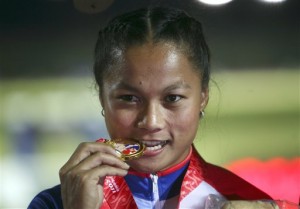
Philippine’s Torres Marestella bites her gold medal after winning women’s long jump at the 26th Southeast Asian (SEA) Games in Palembang, South Sumatera, Indonesia, AP Photo, Achmad Ibrahim
LONDON—As it played out, Marestella Torres needed a leap much shorter than her national record to advance to the semifinals and post a Philippine first in Olympic women’s long jump.
Except that she wasn’t up to it.
On a chilly, early London evening at the full-house Olympic Stadium here Tuesday, the 31-year-old Torres came to grief with a best leap of 6.22 meters in three attempts, her ill-fated journey of redemption falling short by a mere 18 centimeters.
The difference—about the size of her track shoes—went begging and Torres preceded the exit of long-distance runner Rene Herrera, who became the 10th Filipino to crash out of these Games.
That left only BMX rider Daniel Caluag to carry on for what had been an 11-athlete national contingent here. Caluag was battling the world’s finest in the cycling event’s seeding run in Olympic Park at press time.
Competing over a distance that is not his specialty, Herrera simply folded up in the face of the tough opposition and was expectedly eliminated from the 5,000-meter run, dead-last in a field of 16 but the recipient of the crowd’s biggest applause Wednesday morning (See related story).
Herrera was still in the track long after the winner of the first of two heats, Hayle Ibrahimov of Azerbaijan, had crossed the finish line in 13 minutes and 25.23 seconds. The diminutive steeplechase ace from San Jose, Guimaras province, settled for a personal best of 14:14.11, four seconds shy of his target here but a huge improvement on his old PB of 15:01.26.
Torres, the former Asian No. 1 from San Jose, Negros Oriental, could have joined one of the only four outright qualifiers from a starting field of 30 if she only matched her PH record of 6.71m, or at least made 6.40m—the leap of the 12th and last qualifier.
Sobbing in the bus that took her back to the Athletes Village, Torres said all her preparations were ruined by the sudden change in the weather, which saw the mercury drop to 17 degrees Celsius during the competition.
“All my preparations went for naught,” she lamented in Filipino. “It’s so disappointing because I know I’m better now than in Beijing. I can’t explain why I failed again.
“I felt cold out there. My muscles were tight and hurting even during the warm-up.”
The International Amateur Athletic Federation (IAAF) had set a qualification criteria of 6.70m but since only four made the grade, the next best eight jumpers also moved to the next round.
Torres produced a meager 5.98m in her first attempt, improved to 6.21m in the next, and closed out her second Olympic stint with that 6.22m—good for 22nd among the 30 starters. She barely eclipsed her 6.17m leap in Beijing that placed her 34th in a field of 40.
Shara Proctor of Great Britain, first on the runway, became the first qualifier as well with a leap of 6.83m in her first attempt. American Janay Deloach came next with 6.81m followed by Turkey’s Mey Mellis (6.80m) and Russian Elena Sokolova (6.71m).
The last semifinal berth went to Veronika Shutkova of Belarus whose leap of 6.40m was inferior to the 6.62m that Torres posted in topping the Asian All Stars in Almaty, Kazakhstan, in June or the 6.61m leap that won her the gold in a leg of this year’s Asian Grand Prix in India.
If it’s any consolation to Torres, 31, three of the world’s finest long jumpers also struggled.
World No. 1 Brittney Reese of the United States made 6.57m and barely advanced while her compatriot and world No. 3 Chelsea Hayes bombed out with a paltry 6.37m. Also failing to advance was defending Olympic champion Maurren Higa Maggi of Brazil (6.36m).
Apart from Torres and Herrera, already eliminated from the Olympics were swimmers Jasmine Alkhaldi and Jesse Khing Lacuna, archers Rachelle Anne Cabral and Mark Javier, lifter Hidilyn Diaz, skeet shooter Brian Rosatio, judoka Tomohiko Hosina and boxer Mark Anthony Barriga—the only Filipino to reach the second round here.